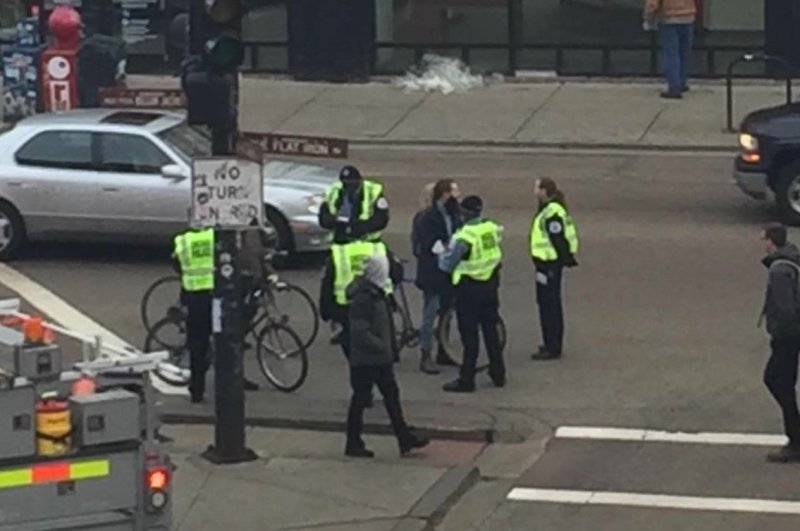Leave it to the Chicago Tribune editorial board to take an important expose by one of its own reporters, about police targeting bike riders in black communities, and use it as an excuse for yet another anti-bicycle screed and call for more ticketing of cyclists citywide.
Tribune transportation columnist Mary Wisniewski did a major service for the cause of bike equity in our city when she uncovered massive disparities in the number of tickets written for cycling offenses in African-American neighborhoods versus other parts of town. Wisniewski found that twice as many bike citations are written in majority-black community areas as majority-Latino or majority-white areas.
None of the the top ten areas for bike tickets during the last eight years was majority white. While 321 tickets were written for infractions like sidewalk riding and wrong-way biking in Austin during a roughly nine-month period last year, a mere five were issued in Lincoln Park during the same timeframe.
There’s no way that these lopsided numbers can be explained away by claims that there are a higher number of infractions by cyclists in black communities, especially since Chicago neighborhood with the most cyclists are generally seeing far fewer citations. It’s not certain what’s causing this causing this phenomenon, although some have argued that this overzealous ticketing of African Americans is really just an excuse for otherwise-illegal stop-and-frisk policing.
Whatever the motivations is, it’s obvious that the Chicago Police Department is enforcing bike rules much more aggressively in communities of color. All residents need to hold them accountable to stop this unjust practice immediately.
Unfortunately, in an editorial published this afternoon, instead of acknowledging that too many tickets are being issued in black communities, the Tribune editorial board made the case that too few are being written in other neighborhoods. What’s needed, they argued, is a North Side crackdown on – you guessed it – the bicycle menace. After all, scofflaws on bikes pose a grave danger to people on foot:
No neighborhood is immune from bicyclists who flout the law. There's the irksome scofflaw who prefers to ride on the sidewalk, selfishly oblivious to pedestrians worried about getting clipped by a passing pedal. There are the red-light runners, who zip through intersections as if they've been given papal dispensation. Cyclists who ride on the wrong side of the road, bikers who treat pedestrians in a crosswalk like pylons in an obstacle course, the list goes on.
Plus, they argued, slapping bicyclists with fines is for their own good. “There are just too many bicyclists on city streets these days — and too many cyclist injuries and deaths — for cyclists to view the rules of the road as optional.”
It’s certainly true that the small minority of Chicago cyclists who speed down crowded sidewalks, or mindlessly bomb red lights with no regard for cross traffic, are a danger to themselves and others and deserve to be ticketed. But the numbers of tickets issued in black neighborhoods, and anecdotes from cyclists in Wisniewski’s article, indicates that, in these areas, the police are also ticketing for harmless behavior such as slow sidewalk riding and “Idaho Stops.”
The latter is the extremely common and totally safe practice of cyclists treating a red light like a stop sign, or a stop sign like a yield sign, which is completely legal in Idaho. In fact, in December Wisniewski was the first to report on a DePaul University study that recommended legalizing the Idaho Stop in Chicago and elsewhere.
And if we’re talking about protecting pedestrians and cyclists in Chicago, the idea of taking the police department’s unfair zero-tolerance approach towards bike infractions in black neighborhoods and making it citywide is completely wrongheaded. While no one has ever been fatally struck by a cyclist in Chicago, motorists kill over 100 people a year in this city.
And while the Tribune is correct that the six bike fatalities in Chicago last year were six too many, most of those cases didn’t involve infractions by cyclists. However, in all five of the crashes that involved a motorist, there’s evidence that the driver was breaking the law. It’s clear that Chicago doesn’t need more ticketing of bike infractions in any neighborhood – we need a crackdown on reckless driving.
In fairness, the Trib editorial does call on motorists to be more aware of bikes on the roads, reminding them to look behind them before exiting their vehicle to avoid “dooring” a cyclist. They also note that installing more bike infrastructure on the South and West Sides would make it safer for residents to ride in the street, which would help decrease the number of sidewalk riding tickets.
But the overall message of the piece isn’t that police are being overly aggressive towards cyclists in black neighborhoods, which is what Wisniewski’s stats actually indicate. Rather, the editorial board suggests that the zero-tolerance enforcement in these communities is appropriate; the police are just taking it too easy on cyclists in other parts of town. “Police have to be as tough on [bike] scofflaws on the North Side as they are on the South and West Sides,” they write.
“We have no quarrel with tough enforcement of city bike laws,” says the editorial. As evidenced by the paper’s tireless vendetta against traffic cameras, unfortunately the Tribune doesn’t have the same attitude towards tough enforcement of laws for drivers.





